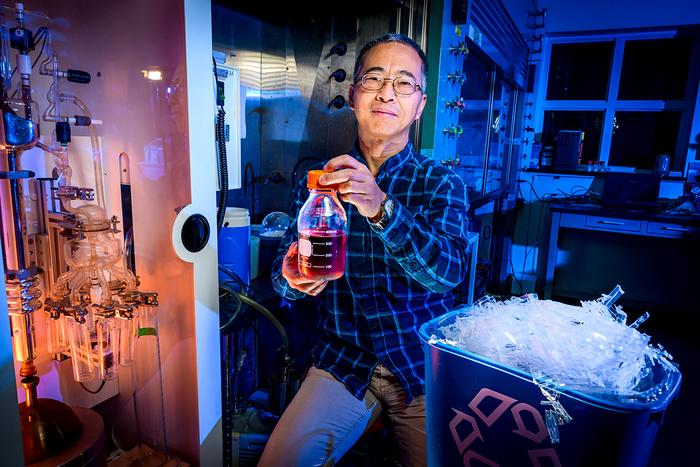
Research scientists at the Illinois Sustainable Technology Center have made a significant breakthrough in the development of sustainable aviation fuels. They have devised a novel method for transforming waste polystyrene, a common plastic found in numerous everyday items, into ethylbenzene—a crucial additive that enhances the performance of sustainable jet fuels. This pioneering work addresses one of the most pressing challenges currently facing the aviation sector: the transition away from fossil fuels while ensuring the functionality and safety of aircraft fuel systems.
The reliance of commercial aircraft on fossil fuels is nearly absolute, raising concerns about climate change and environmental degradation. The aviation industry has been under increasing pressure to explore more sustainable alternatives to traditional jet fuel. Traditional fuels derived from oil and fossil sources contain significant amounts of aromatic hydrocarbons, known for their role in maintaining the lubrication of mechanical parts and ensuring the integrity of seals against leaks in fuel systems. The challenge is that sustainable fuel sources, such as waste fats, oils, plant biomass, and other nonpetroleum materials, typically fall short in providing these essential hydrocarbons.
The researchers’ study, recently published in the journal ACS Sustainable Chemistry and Engineering, presents an innovative solution to this issue. By converting polystyrene waste into ethylbenzene, the researchers have created a sustainable source of aromatic hydrocarbons that could fundamentally alter the production landscape of sustainable aviation fuels. This development is particularly crucial given that the U.S. government has set ambitious targets for sustainable fuel production, aiming for domestic production of three billion gallons per year by 2030 and a staggering 35 billion gallons by 2050.
One significant barrier to the adoption of sustainable aviation fuels is the stringent regulations that mandate blends must contain a minimum percentage of aromatic hydrocarbons—currently set at 8.4%. This requirement stems from safety and operational standards that ensure compatibility with existing aircraft and fuel infrastructure. However, the aviation industry is only able to incorporate approximately 0.5% aromatic hydrocarbons in current sustainable fuel blends, severely restricting their viability and market penetration.
The Illinois researchers selected ethylbenzene due to its favorable combustion characteristics, particularly its lower propensity to generate soot compared to other highly aromatic compounds. The decision to utilize polystyrene as the feedstock stems from its abundance—the United States generates around 2.5 million metric tons of polystyrene annually, with a majority ending up in landfills. By capturing this waste plastic and converting it into an essential fuel additive, the researchers are not only addressing a waste management issue but also contributing to a more sustainable future for aviation.
The conversion process involves two key steps: thermal pyrolysis and hydrogenation. During pyrolysis, polystyrene is subjected to high temperatures, leading to its breakdown into a liquid rich in styrene, the precursor to ethylbenzene. Subsequently, hydrogenation refines this product into crude ethylbenzene, and distillation processes enhance purity, yielding a product with up to 90% purity. The preliminary findings indicate that ethylbenzene produced from polystyrene can perform comparably to its fossil-fuel-derived counterpart when blended with sustainable aviation fuels.
Further exciting developments arise from preliminary cost analyses, suggesting that the polystyrene-derived ethylbenzene could be produced at a lower cost than traditional methods reliant on crude oil. This cost-effectiveness, coupled with a lifecycle assessment showing a potential reduction in carbon emissions by 50% to 60%, positions this method as a viable and environmentally friendly alternative for the aviation sector.
As the research continues, the team hopes to refine this sustainable additive further, increasing its compatibility and performance with existing fuel systems. The long-term vision is not only to facilitate a broader adoption of sustainable aviation fuels but also to pave the way for significant reductions in the carbon footprint of the aviation industry.
The implications of this research extend beyond just jet fuel; they highlight the importance of innovative approaches in waste management and sustainable material use. By finding ways to repurpose materials that would otherwise contribute to environmental degradation, the researchers also contribute to a circular economy—a model that aims to reduce waste through continual reuse of resources.
Overall, this advancement in sustainable aviation fuel production underscores a critical step toward aligning the aviation industry with global sustainability efforts. As governments, organizations, and individuals increasingly demand solutions to the climate crisis, research like this will be paramount in shaping a greener future.
The Illinois Sustainable Technology Center’s ongoing studies emphasize the urgency of transitioning to renewable energy sources in sectors that have historically been resistant to change. The transformative potential of this research could inspire other industries to explore similar avenues for sustainability, leading to broader environmental benefits across various sectors.
This study’s implications go beyond aviation, offering insights into how other sectors reliant on fossil fuels might evolve. By inspiring innovation in the production of sustainable fuels, researchers are positioning themselves as key players in the global transition towards renewable energy.
It is essential for industry stakeholders to pay attention to these developments as they may set the trend for future innovations within sustainable energy. The dedication to establishing a low-carbon economy is more critical than ever, and the solutions being developed today will shape the industries of tomorrow.
With continued support from entities such as the U.S. Department of Energy, the momentum towards sustainable aviation fuel solutions could accelerate, leading to more breakthroughs like those achieved at the Illinois Sustainable Technology Center. The work conducted therein can serve as a model for future research and industry practices aimed at sustainability and environmental stewardship.
By pushing the boundaries of what is possible with waste materials, the researchers are not only contributing to vital scientific advancement but also inspiring hope for a sustainable future.
Subject of Research: Production of a sustainable aviation fuel additive from waste polystyrene
Article Title: Production of a sustainable aviation fuel additive from waste polystyrene
News Publication Date: 18-Dec-2024
Web References: ACS Sustainable Chemistry & Engineering
References: DOI: 10.1021/acssuschemeng.4c06748
Image Credits: Photo by Fred Zwicky
Keywords
Sustainable aviation fuels, ethylbenzene, polystyrene, thermal pyrolysis, hydrogenation, aromatic hydrocarbons, climate change, renewable energy.





